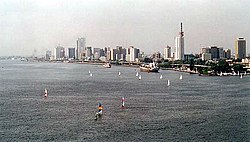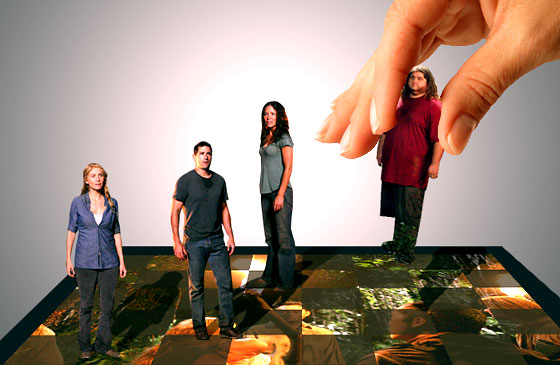Our dear friend Jon, foreign service officer extraordinaire, will be stationed in...
Lagos (
pron. IPA:
/ˈleɪgɒs/ or
/ˈlɑːgoʊs/ overseas) is the most populous
conurbation in
Nigeria with more than 8 million people
[2]. It is
the most populous in Africa, and currently estimated to be the second fastest growing city in Africa (7th fastest in the world)
[3], immediately following
Bamako. Formerly the capital of Nigeria, Lagos is a huge metropolis which originated on islands separated by
creeks, such as
Lagos Island, that fringe the southwest mouth of
Lagos Lagoon, protected from the
Atlantic Ocean by long
sand spits such as Bar Beach which stretch up to 100 km east and west of the mouth. From the beginning, Lagos has spread on the mainland west of the lagoon and the
conurbation, including
Ikeja and
Agege, now reaches more than 40 km north-west of Lagos Island. The city is the economic and financial capital of Nigeria.
History
Lagos was a
Yoruba settlement of
Awori people initially called Oko. The name was later changed to
Eko (Edo: "cassava farm") or
Eko ("war camp") during the
Kingdom of Benin occupation. This is the name by which 'Lagos' is called by the Yoruba when they speak of 'Lagos', which never existed in Yoruba language. It is likely that the name 'Lagos' was given to the town by the first Portuguese settlers who navigated from a coastal town of the same name in Portugal. The present day Lagos state has a higher percent of Awori, who migrated to the area from Isheri along the
Ogun river. Throughout history, it was home to a number of warring tribes who had settled in the area. During its early settlement, it also saw periods of rule by the
Kingdom of Benin.
[4] Portuguese explorer Ruy de Sequeira visited the area in 1472, naming the area around the city Lago de Curamo; indeed the present name is Portuguese for "lakes". Another explanation is that Lagos was named for Lagos, Portugal - a maritime town which at the time was the main centre of the Portuguese expeditions down the African coast and whose own name is derived from the Latin word Lacobriga.
From 1404-1889 it served as a major centre of the slave trade, ruled over by Yoruba kings called the Oba of Lagos. In 1841 Oba Akitoye ascended to the throne of Lagos and tried to ban slave trading. Lagos merchants, most notably Madam Tinubu, resisted the ban, deposed the king and installed his brother Oba Kosoko.
While exiled, Oba Akitoye met with the British, who had banned slave trading in 1807, and got their support to regain his throne. In 1851 he was reinstalled as the Oba of Lagos
Lagos was formally annexed as a British colony in 1861. This had the dual effect of crushing the slave trade and establishing British control over palm and other trades.[5]
The remainder of modern-day Nigeria was seized in 1887, and when the Colony and Protectorate of Nigeria was established in 1914, Lagos was declared its capital. It continued to be the capital when Nigeria gained its independence from Britain in 1960.
Lagos experienced rapid growth throughout the 1960s and 1970s as a result of Nigeria's economic boom prior to the Biafran War.
Lagos was the capital of Nigeria from 1914 up to 1991; it was stripped of this title when the Federal Capital Territory was established at the purpose-built city of Abuja. However, most government functions (especially the head of state) stayed in Lagos for a time since Abuja was still under construction. In 1991, the head of state and other government functions finally moved to the newly built capital in a mass exodus.
In 2002, an accidental detonation of military explosives killed more than 1000 people.
Geography
The city of Lagos lies in south-western Nigeria, on the
Atlantic coast in the
Gulf of Guinea, west of the
Niger River delta, located on longitude 3° 24' E and latitude 6° 27' N. On this stretch of the high-rainfall
West African coast, rivers flowing to the sea form swampy lagoons like Lagos Lagoon behind long coastal sand spits or sand bars. Some rivers, like
Badagry Creek flow parallel to the coast for some distance before finding an exit through the sand bars to the sea.
The three major urban islands of Lagos in Lagos Lagoon are Lagos Island, Ikoyi, and Victoria. These islands are separated from the mainland by the main channel draining the lagoon into the Atlantic, which forms Lagos Harbour. The islands are separated from each other by creeks of varying sizes and are connected to Lagos Island by bridges. However the smaller sections of some creeks have been sand filled and built over.
Lagos Island contains many of the largest markets in Lagos, its central business district, the central mosque, and the Oba's palace. Though largely derelict, Tinubu Square on Lagos Island is a site of historical importance; it was here that the Amalgamation ceremony that unified the North and South took place in 1914.
Ikoyi island, situated to the east of Lagos Island, housed the headquarters of the federal government and all other government buildings. It also has many hotels, and one of Africa's largest golf courses. Originally a middle class neighbourhood, in recent years, it has become a fashionable enclave for the upper middle class to the upper class.
Ikeja houses the state government buildings and state parliament.
The Victoria Island, situated to the south of Lagos Island. It boasts of several sizable commercial and shopping districts (including Nigeria's largest mall and movie theater) and several trendy beaches.
Across the main channel of the lagoon from Lagos Island, a smaller island called Iddo Island lay close to the mainland, and today is connected to the mainland like a peninsula. Three large bridges join Lagos Island to the mainland: Eko Bridge and Carter Bridge which start from Iddo Island, and the Third Mainland Bridge which by-passes congested mainland suburbs through the lagoon.
Most of the population of Lagos lives on the mainland, which is the site of industry and known for its music and nightlife, notably in areas around Yaba and Surulere, as well as the National Stadium Complex. Mainland districts include Ebute-Meta, Surulere, Yaba (Lagos) (site of the University of Lagos), Mushin, Maryland, Isolo, Ikotun, Ipaja, Ejigbo and Ikeja, site of Murtala Mohammed International Airport and the capital of Lagos State.
Climate
The climate in Lagos is similar to that of the rest of southern Nigeria. There are two rainy seasons, with the heaviest rains falling from April to July and a weaker rainy season in October and November. There is a brief relatively dry spell in August and September and a longer dry season from December to March. Monthly rainfall between May and July averages over 300 mm (12
in), while in August and September it is down to 75 mm (3 inches) and in January as low as 35 mm (1.5 inches). The main dry season is accompanied by
harmattan winds from the
Sahara Desert, which between December and early February can be quite strong. The average temperature in January is 27°C (79°F) and for July it is 25°C (77°F). On average the hottest month is March; with a mean temperature of 29°C (84°F); while July is the coolest month.
[6]Administration and demographics
In terms of administration, Lagos is not a municipality and has therefore no overall city administration. The Municipality of Lagos, which covered Lagos Island, Ikoyi and Victoria Island as well as some mainland territory, was managed by the Lagos City Council (LCC), but it was disbanded in 1976 and divided into several Local Government Areas (most notably Lagos Island LGA, Lagos Mainland LGA and Eti-Osa LGA). The mainland beyond the Municipality of Lagos, on the other hand, comprised several separate towns and settlements such as Mushin, Ikeja and Agege. In the wake of the 1970s Nigerian oil boom, Lagos experienced a population explosion, untamed economic growth, and unmitigated rural migration. This caused the outlying towns and settlements to develop rapidly, thus forming the greater Lagos metropolis seen today. The history of Lagos is still evidenced in the layout of the LGAs which display the unique identities of the cultures that established them.
Today, the word Lagos most often refers to the urban area, called "Metropolitan Lagos" in Nigeria, which includes both the islands of the former Municipality of Lagos and the mainland suburbs. All of these are part of Lagos State, which now comprises 20 LGAs. Lagos State is responsible for utilities including roads and transportation, power, water, health, and education.
Metropolitan Lagos (a statistical division, and not an administrative unit) extends over 16 of the 20 LGAs of Lagos State, and contains 88% of the population of Lagos State, and includes semi-rural areas.
Lagos was the former capital city of Nigeria but it has since been replaced by Abuja. Abuja officially gained its status as the capital of Nigeria on 12 December 1991, although the decision to move the federal capital had been made in decree no. 6 of 1976.
Lagos is also home to the High Court of the Lagos State Judiciary, housed in an old colonial building on Lagos Island.[7]
Census data for Lagos
According to the preliminary results of the 2006 census, there are 7,937,932 inhabitants in Metropolitan Lagos.
[2] This figure is lower than what had been anticipated and has created a controversy in Nigeria.
Lagos Island, the central LGA and historic centre of Metropolitan Lagos, had a population of 209,437 as of the 2006 Census.
[8] Authorities of Lagos State have attacked the results of the 2006 census, accusing the National Population Commission of having undercounted the population of Lagos State, an accusation strongly denied by the National Population Commission.[9] [10]
Lagos is, by most estimates, one of the fastest-growing cities in the world. Lagos State is currently experiencing a population increase of about 275,000 persons per annum. In 1999 the United Nations predicted that the city's metropolitan area, which had only about 290,000 inhabitants in 1950, would exceed 20 million by 2010 and thus become one of the ten most populated cities in the world. This projection, however, must now be revised downward due to the results of the 2006 census.
Like most cities, there is a huge spectrum of wealth distribution among the people that reside in Lagos. It ranges from the very wealthy to the very poor. Lagos has attracted many young entrepreneurs and families seeking a better life from throughout Nigeria and beyond.
Economy
Lagos is Nigeria's most prosperous city, and much of the nation's wealth and economic activity are concentrated there. The commercial, financial and business centre of Lagos and of Nigeria remains the business district of Lagos Island, where most of the country's largest banks and financial institutions are located. More than half of Nigeria's industrial capacity is located in Lagos's mainland suburbs, particularly in the Ikeja industrial estate. A wide range of manufactured goods are produced in the city, including machinery, motor vehicles, electronic equipment, chemicals, beer, processed food, and textiles. The standard of living is higher in Lagos than in the rest of Nigeria.
The Port of Lagos is Nigeria's leading port and one of the largest in Africa. It is administered by the Nigerian Port Authority and is split into three main sections: Lagos port, in the main channel next to Lagos Island, no longer used much, Apapa Port (site of the container terminal) and Tin Can Port, both located in Badagry Creek which flows into the Lagos Harbour from the west.[11] The port features a railhead.
The port handles imports of consumer goods, foodstuffs, motor vehicles, machinery, and industrial raw materials. Its export trade in timber and agricultural products such as cacao and groundnuts has declined since the early 1970s, although the port has seen growing amounts of crude oil exported, with export figures rising between 1997 and 2000.[12] Oil and petroleum products provide 20% of GDP and 95% of foreign exchange earnings in Nigeria as a whole.[13]
Culture
Music & film industry
Lagos is famous throughout West Africa for its music scene. Lagos has given birth to a variety of styles such as highlife, juju, fuji, and Afrobeat. In recent years Lagos has been the fore-runner with African styled hip-hop branded Afrohip-hop.
Lagos is the centre of the Nigerian film industry, often referred to as 'Nollywood.' Idumota market on Lagos Island is the primary distribution centre. Also many films are shot in the Festac area of Lagos.
The cinemas are gradually losing their supporters to the movie industry. Yoruba films happen to be the most watched in the cinemas, followed by Indian films. Films are not premiered for a long period of time in the western sense, especially with Yoruba films. The English spoken films move directly from the studios to the market.
Iganmu is home to the National Arts Theatre — the primary centre for the performing arts in Nigeria.
Football
As in the rest of Nigeria, football is the most popular sport. The Nigeria Football Association (NFA) and the Lagos State Football Association (LAFA) are both based in Lagos. A prominent Lagos soccer club Julius Berger FC (a member of the Nigerian Premier League) is set to close in 2008, potentially leaving Lagos without a Premier League team.[17]
The Nigerian national football team, also known as the Super Eagles, used to play almost all of their home games in Lagos; however, games are now split between the Surelere Stadium in Lagos and the larger, newer Abuja Stadium in Abuja, which may soon become the default home of the Super Eagles.[18][19]
Tourism
Lagos is not a popular tourist destination, as it is primarily business-oriented and also has a reputation for been a fast paced community. Despite these visitors are still attracted to some of the culture, entertainment scenes and vitality that the city has to offer. Tourist attractions include the Oba's Palace, the National Museum, and the beach resorts.
External links
- Government
- News
- Other
Lagos is at coordinates
 6°27′09″N 3°24′49″E / 6.4524, 3.4136
6°27′09″N 3°24′49″E / 6.4524, 3.4136
...tickets are only $2063, but hey, that's what frequent flier miles (and friends) are for!
 Genesis,
Genesis, 











